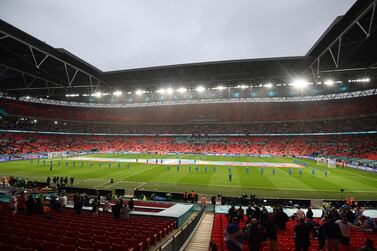The UK government has announced up to 60,000 fans will be allowed to attend the semi-finals and final of Euro 2020.
Wembley Stadium in London, which is hosting all three matches, would be at 66 per cent capacity.
The football matches will be attended by the largest crowds for a sporting event in the UK since the first Covid-19 lockdown in March 2020.
Why is the UK lifting crowd capacity for Euro 2020?
Britain was supposed to lift all social distancing restrictions on June 21 but this was delayed by four weeks because of new infections caused by the fast-spreading Delta variant.
Howver, crowds will be allowed to attend under the Events Research Programme.
The scheme aims to explore how major events can resume safely without leading to an increase in Covid-19 cases.
It has already been used for a number of other events, including the Brit Awards, the Test cricket series between England v New Zealand and a live music event in Liverpool.
Up to 14,000 were allowed to attend those events.
Wembley's capacity was reduced to 22,500 for Euro 2020 group fixtures and 45,000 for the two knockout games it will host before the semi-finals and final.
What are the entry requirements for Euro 2020?
As in all events under the programme, fans attending the semi-finals and final are required to have received two doses of a Covid-19 vaccine at least two weeks before the match.
Failing that, they can show evidence of a negative lateral flow test taken up to 48 hours before the match they are attending.
The government said ticket holders registered with a GP in England would be able to display their proof of vaccination on the NHS app.
Has the Events Research Programme led to a Covid-19 outbreak?
Culture Minister Nigel Huddleston on Tuesday said none of the events held under the scheme had led to a major outbreak.
However, the government is yet to publish a full report on the programme.
“Although we are not yet in a position to publish the full report ... post-event data have not shown any evidence of the events causing outbreaks,” he said.
“If they had, we would have communicated that information urgently.”
Culture Secretary Oliver Dowden said Wembley hosting the latter stages of the tournament would be an “unforgettable moment” in the UK’s post-pandemic recovery.
“We have worked extremely closely with UEFA and the Football Association to ensure rigorous and tight public health measures are in place while allowing more fans to see the action live,” he said.
Can fans from overseas attend the final stages of Euro 2020?
It is not yet clear whether overseas fans will be allowed to attend the semi-finals and final, with the government due to release more information soon.
However, UK border entry requirements state travellers from most overseas countries must complete 10 days’ quarantine at home and take several tests.
Travellers from amber countries are eligible for release on day five of quarantine if they test negative.
Those coming from red-list countries must quarantine in a government-approved hotel.
Passengers arriving from green-list countries do not need to quarantine on entry to the UK, although there are no countries from continental Europe on that list.
Dr Duncan Robertson from Loughborough University questioned whether officials from red and amber list countries would be required to quarantine for the matches.
“Where is the risk assessment?” he said.
And will officials/politicians/sponsors/broadcasters/fans from Amber/Red list countries have to quarantine/isolate?
— Dr Duncan Robertson (@Dr_D_Robertson) June 22, 2021
And will changes to quarantine/isolation for Amber/Red list countries be made for everyone *because* of this decision?
And where's the risk assessment? https://t.co/AKyrttaR11
Others criticised the government for allowing the matches to proceed in front of a large crowd while restrictions remain in place for weddings and cultural activities.
But music festivals can’t go ahead? For Pete's sake https://t.co/OidQyeV0RH
— Fuad Alakbarov (@DrAlakbarov) June 22, 2021
Will they be allowed to sing? 60,000 football fans vs. 6 choral singers (or 30 outside, socially distanced, of course) - bit of a unlevel playing field, wouldn't you say, @OliverDowden? But you just don't care enough, do you?
— David Fawcett (@choralwork) June 22, 2021
60,000 in stadium but can't dance at a wedding. Make it make sense.
— 👑 🔴 Rashfordinho (@CraigSta2018) June 22, 2021
Will more events be held with a larger crowd capacity in the UK?
Some of the biggest events in the summer’s sporting calendar, including the Wimbledon Tennis Championships, the rugby league Challenge Cup final and men’s international cricket involving England, Pakistan and Sri Lanka will also go ahead with larger capacities as part of the next phase of the Events Research Programme.
This stage will also include more cultural events “close to full capacity”, the government said.







